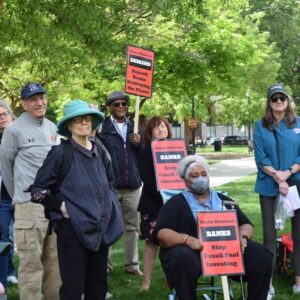August 19, 2009
Burrus: ‘Short-Sighted’ Strategy Will Mean Long-Term Damage
In a follow-up to recent testimony before a House subcommittee, APWU President William Burrus explored alternatives to station-and-branch closures, which the Postal Service is planning in reaction to a severe financial crisis.
“Closing and consolidating post offices based on recession-level volume is short-sighted, and will leave the Postal Service with an infrastructure unable to accommodate the larger volume of mail that will be generated by a more robust economy,” Burrus wrote Aug. 13.
The union president’s comments were in response to written questions posed by subcommittee Chairman Stephen Lynch (D-MA) following a hearing on July 30. The hearing was curtailed when lawmakers were summoned to the House floor to vote.
The union president asserted that the Postal Service’s financial problems are due to a provision of the Postal Accountability and Enhancement Act of 2006 (PAEA) that forces the USPS to “pre-fund” retirees healthcare benefits — a burden no other federal agency or private business must bear.
“Legislative relief from the funding requirement is essential,” Burrus wrote, but he advanced other alternatives as well.
“The Postal Service could accelerate employee attrition by offering a reasonable retirement incentives,” he said. “Postal managers say they cannot afford incentives, but this is a short-sighted response. They cannot afford not to offer them. At a time when postal finances are in such dire straits, how can postal management refuse to allocate a minimum amount in order to generate substantial savings in future years?” Burrus asked.
Postal management also shouldlimit the workshare discounts that are given to large mailers for activities that could be performed by postal employees, such as sorting mail and affixing bar codes, Burrus said. “The Postal Service could increase revenue in the range of $1 billion annually by eliminating rate discounts for processing activities that can be performed by postal employees with underutilized USPS equipment,” he wrote.
In addition, the USPS should redefine its business plan, recognizing that its principle source of revenue is advertising. Postal operations should be adjusted to reflect this reality, he said.
In response to a question about thepublic comment and appeals process for station and branch consolidations, Burrus wrote, “The union and postal management have negotiated an agreement that ‘all existing retail operations will remain within the installation of which they are a part.’ I expect that postal management will fully comply with this agreement.”
He also called for improvements to the process of public notification, so that citizens have a meaningful voice in service changes. Burrus noted that “The Postal Service treats ‘stations and branches’ very differently from ‘post offices,’ claiming that decisions to close stations and branches are not subject to appeal;” he pointed out that the Postal Regulatory Commission disagrees with the Postal Service on the appropriate procedure to follow when considering the closure of stations and branches.
“Because of these differences, legislative change may be needed to ensure that citizens are heard and that their concerns are considered,” he said.



